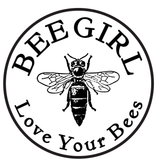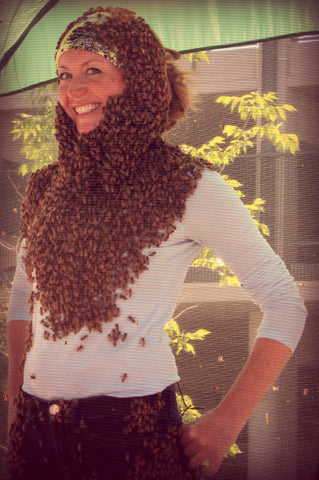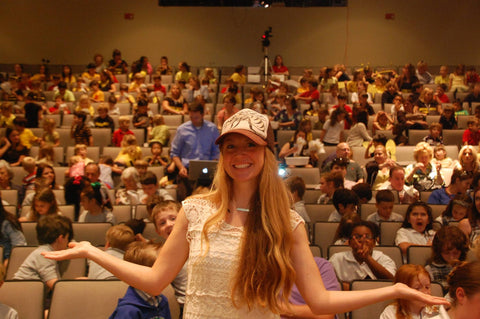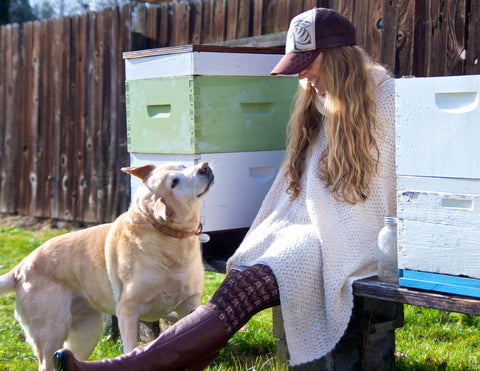
 The honey bee needs more friends like Sarah Red-Laird. She's working hard to bring honeybees closer to our hearts. She began the adventure of a nonprofit bee education program called the Bee Girl Organization in 2011 and has grown from teaching kid's programs to now speaking at national events and collaboration. She keeps her roots in teaching children about the honeybee's science but has traveled all over the nation working wonders for bee education. Keeping a sustainable beauty in this earth is why she has so much passion for educating our nation's children about the honeybee on their land.
The honey bee needs more friends like Sarah Red-Laird. She's working hard to bring honeybees closer to our hearts. She began the adventure of a nonprofit bee education program called the Bee Girl Organization in 2011 and has grown from teaching kid's programs to now speaking at national events and collaboration. She keeps her roots in teaching children about the honeybee's science but has traveled all over the nation working wonders for bee education. Keeping a sustainable beauty in this earth is why she has so much passion for educating our nation's children about the honeybee on their land.
At Medicine Mama's Apothecary, we love to find gems, such as Bee Girl Organization,
who share in our enjoyment of making this world more beautiful. Our many thanks to Sarah for sitting with us and sharing her love for her hives and the adventures they go on together.
 I got to see you grow a beard of bees at the farmer's market. Was that your first time and what was the whole process like?
I got to see you grow a beard of bees at the farmer's market. Was that your first time and what was the whole process like?
"It was my first time and the experience was kind of transcendent and really special, however, it was so much work: two full days of preparation and breakdown. Getting the bees in a state where they are ready to climb on your face and not sting you. Going through your hives, finding the group with the best temperament. The young bees are what you want because they don't want to fly around as much. Getting bees at a certain age who want their mama so then when we put a synthetic queen-pheromone medallion on my neck they clung to make a beard. Their mom was taken away and hid for about 20 minutes beforehand, so they thought I was mom. And you have to feed them a ton, because fat bees are happy bees. It was a lot of prep and I wasn't about to look up on the internet 'how to put 1,000 bees on my face.' So I called Dr. Mike Burgess, a professor from Oregon State University, to come help mentor me through it. He has been a beekeeping professor for about 40 years and has done around 300 beards, wonder bras, bikinis, and shorts."
Watching your Ted Talk, you mentioned when you were a child the beekeepers on your family property were captivating for you. Why would you say that the bees and keepers captivated your heart?
"Beekeeping and the relationship a beekeeper has with their bees is very inherent, similar to the way an NBA player knows that they were born to play basketball, or Meryl Streep was born to act. I feel like bees make sense to me and I knew this was what I was going to do. I didn't think my bee keeping would go so far in this direction with the Bee Girl brand. I thought I'd be this eccentric old woman that has beehives in the backyard in her old age."
Why did you decide to take beekeeping to the platform of Bee Girl brand with the child education, PR, and speaking collaborations?

"The Bee Girl organization gave me the opportunity to take the best of my experiences and talents and put them into one. Create something I knew I could excel at and fill a niche. Supply and demand, and right now there's a huge demand for education. People are wondering why the bees are dying and how they can help. Bees, somehow, have been holding on to their 15 minutes of fame for almost a decade now and people are hungry to know more about them, what's going on with them, and how they can be a part of the solution in their survival. A lot of teachers are seeing the value of honeybees, school gardens, other pollinators, and the array of social science and biology that can be brought into the classroom. I'm able to come into a school and get the kids super excited about bees! The program has been catching like wildfire and now I'm traveling all over the world talking to kids about bees. It was really serendipitous to get to take what I love to do and build the Bee Girl brand around that."

What kind of conversations are you having among the beekeeping community and how are they finding sustainability to keeping the bees alive and healthy?
 "There's definitely a divide in the backyard beekeepers and commercial beekeeper. The two groups don't understand each other very well, but I am trying to do what I can to bridge that gap. I have one foot in each. My mentors are all commercial beekeepers and I work with them in the spring during the almond pollination. I very much understand what they do and why they do it, but then I work with hobbyists too. I think there are a lot of interesting and innovative things that the backyard beekeepers are up to that is scalable, but often times the commercial industry thinks they don't understand because backyard beekeepers don't have a thousand hives to keep alive, they only have two. There's a lot of very smart hobbyist beekeepers out there thinking outside the box on how to keep their bees alive. However, the hobbyist can see the commercial beekeeper as this big ogre who marches their bee into the ground, but they are often times the sweetest and greatest beekeepers I know. They do everything they possibly can to be easier on their bees."
"There's definitely a divide in the backyard beekeepers and commercial beekeeper. The two groups don't understand each other very well, but I am trying to do what I can to bridge that gap. I have one foot in each. My mentors are all commercial beekeepers and I work with them in the spring during the almond pollination. I very much understand what they do and why they do it, but then I work with hobbyists too. I think there are a lot of interesting and innovative things that the backyard beekeepers are up to that is scalable, but often times the commercial industry thinks they don't understand because backyard beekeepers don't have a thousand hives to keep alive, they only have two. There's a lot of very smart hobbyist beekeepers out there thinking outside the box on how to keep their bees alive. However, the hobbyist can see the commercial beekeeper as this big ogre who marches their bee into the ground, but they are often times the sweetest and greatest beekeepers I know. They do everything they possibly can to be easier on their bees."
"Commercial beekeepers are up against some serious challenges. Dr. Dennis Van Englesdorp was recently cited in an article for Wall Street Journal stating that, 'we are not worried about the bees going extinct, but the beekeepers'. While there is a rising demand for sustainably farmed food, only 5% of food produced in the US is organic. 1 billion pounds of pesticides are dumped on our food annually, and the beekeepers and bees are swimming in it. I believe collaboration, mentorship, and sharing of ideas between all beekeepers is the best way forward. The Bee Girl Organization's "Next Generation Beekeepers Initiative" aims to do just that. We want to clearly identify our problems, so action-based solutions can be a new sustainable narrative to save our bees and beekeepers."
 How can you see the concept of sustainable beauty playing out in your life, with the Bee Girl brand and your own self?
How can you see the concept of sustainable beauty playing out in your life, with the Bee Girl brand and your own self?
"As we talk about farming and food, we can't forget about our outer health as well as our inner health. I'm quite adamant about putting products on that my skin can eat. I'm not afraid of aging, I just want to do it gracefully. As consumers we need to be more inquisitive of where our supply comes from. As humans we need to revisit our relationship with food and start delving deeper into how it gets to our plate. The role we take in making it a healthier system for ourselves, our farmers, our wildlife and especially the bees!"

 I got to see you grow a
I got to see you grow a  How can you see the concept of sustainable beauty playing out in your life, with the Bee Girl brand and your own self?
How can you see the concept of sustainable beauty playing out in your life, with the Bee Girl brand and your own self?